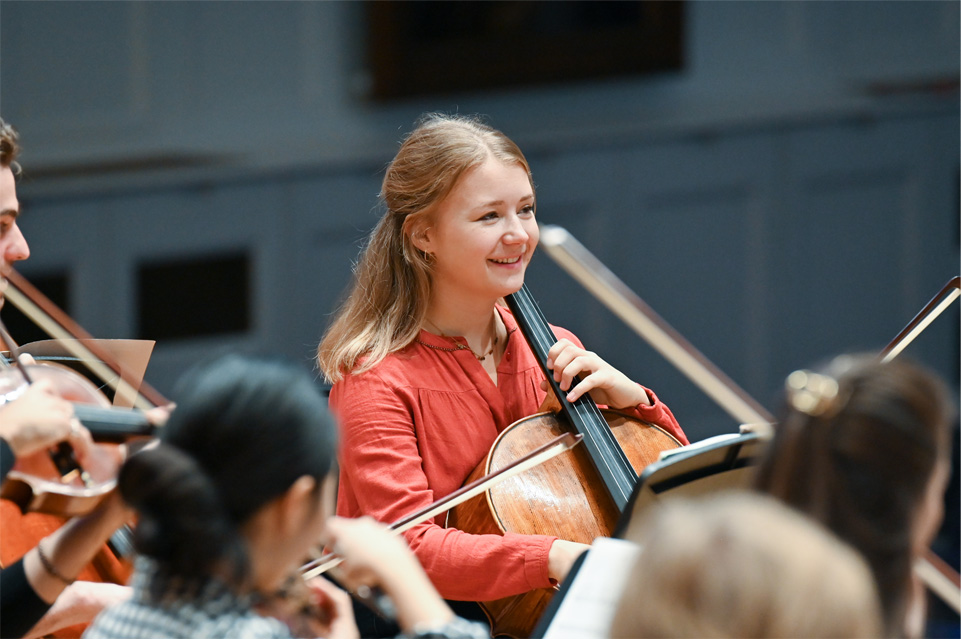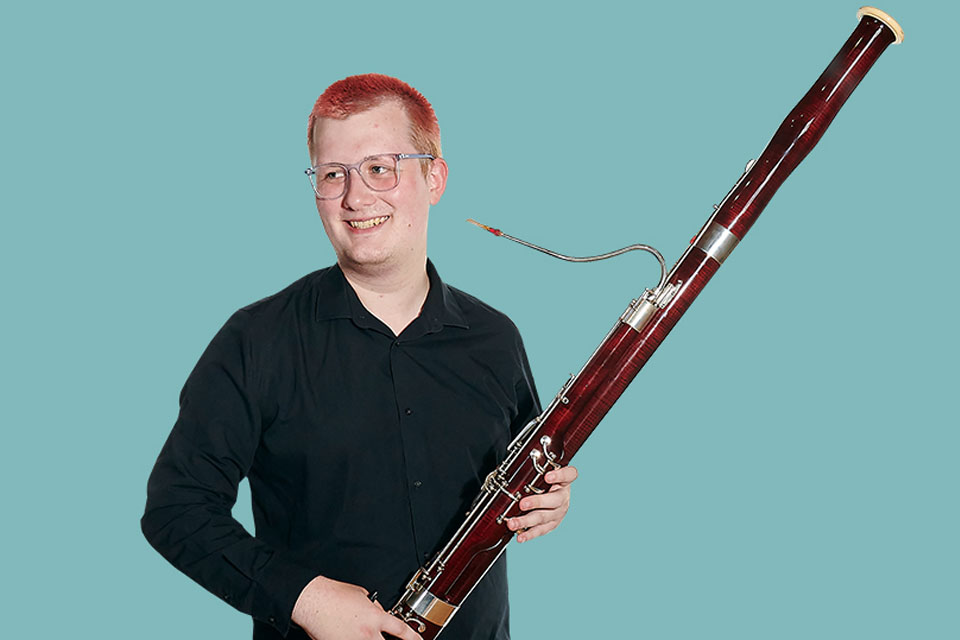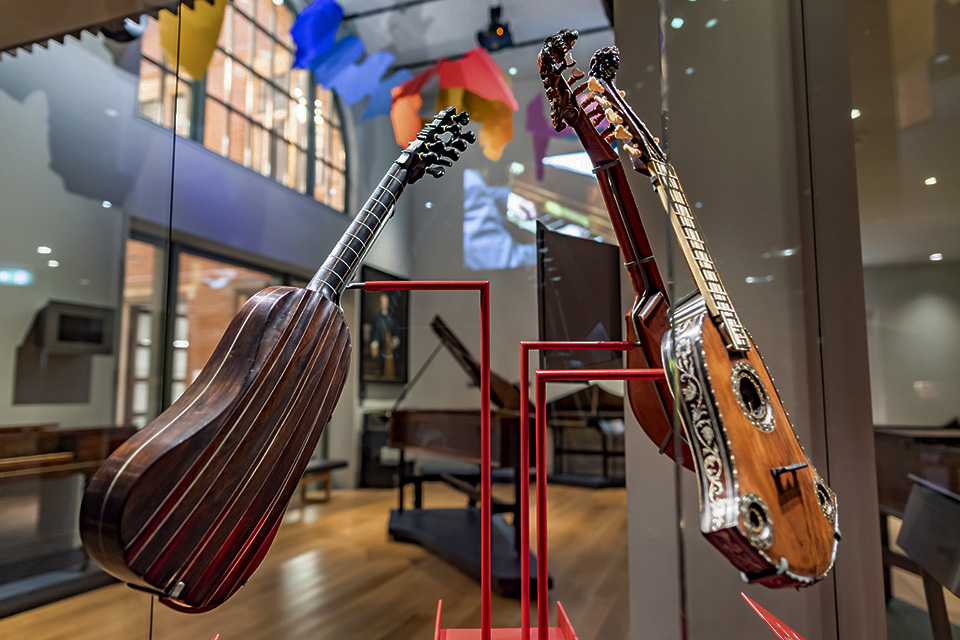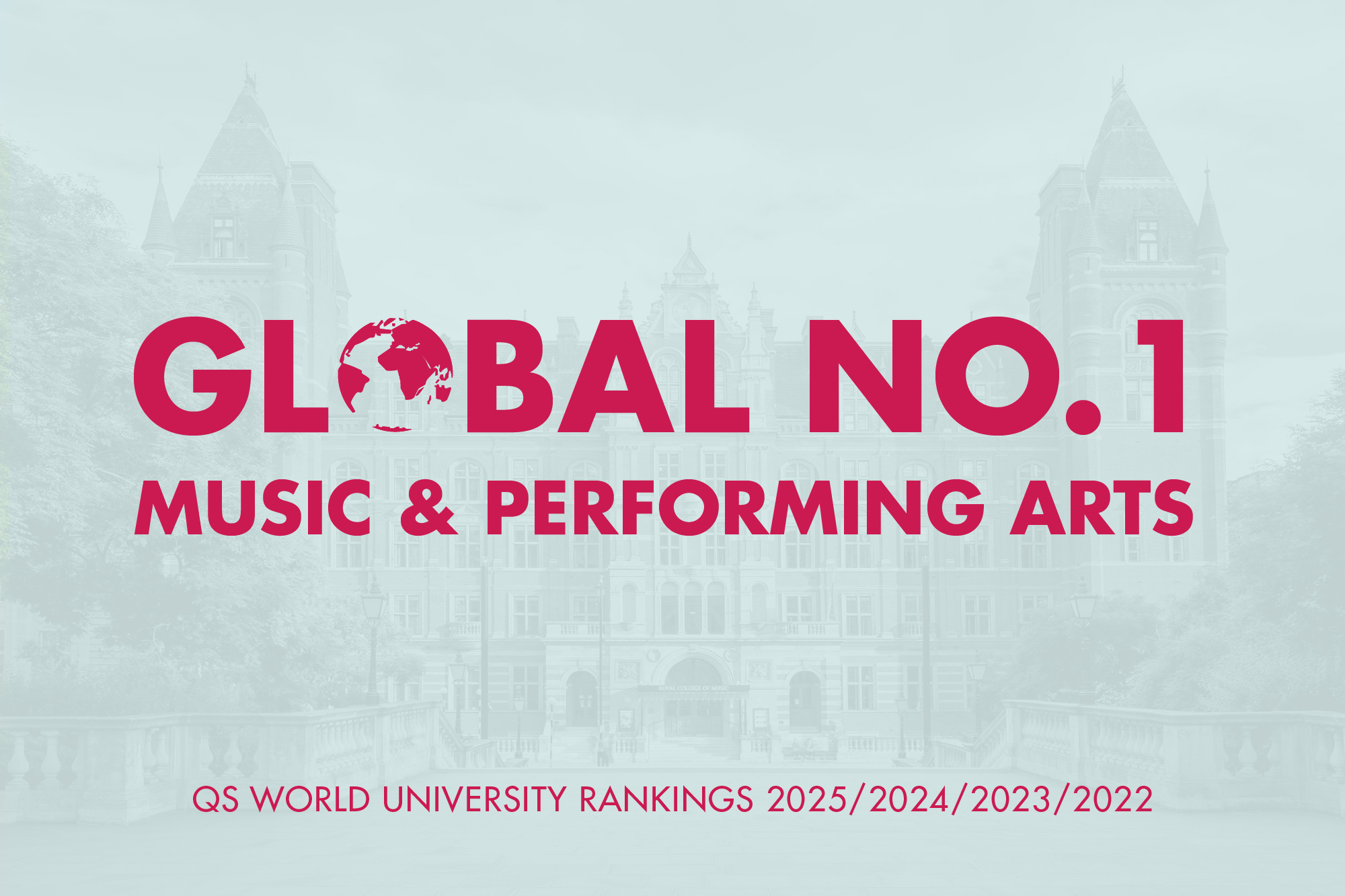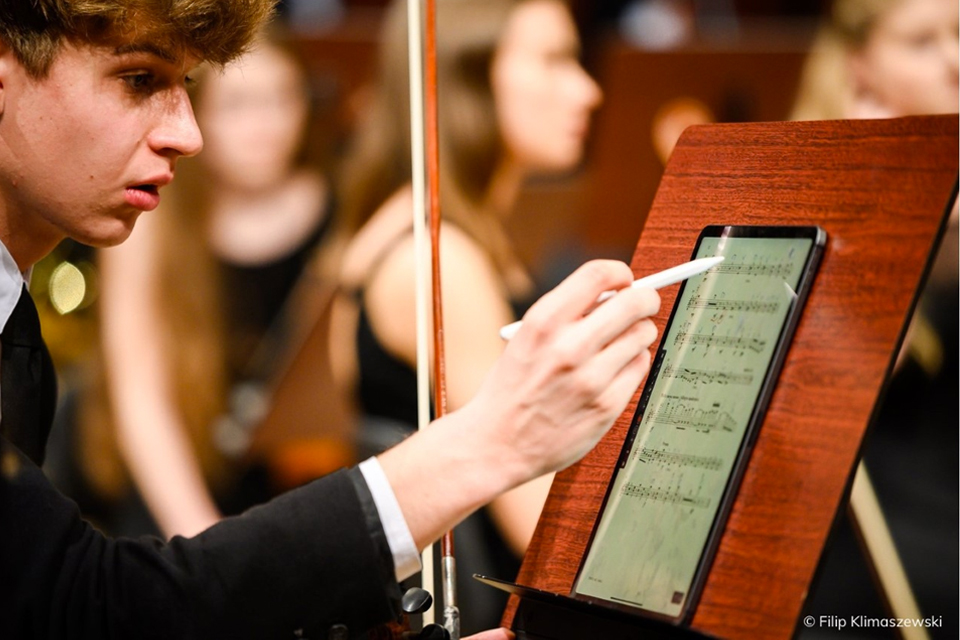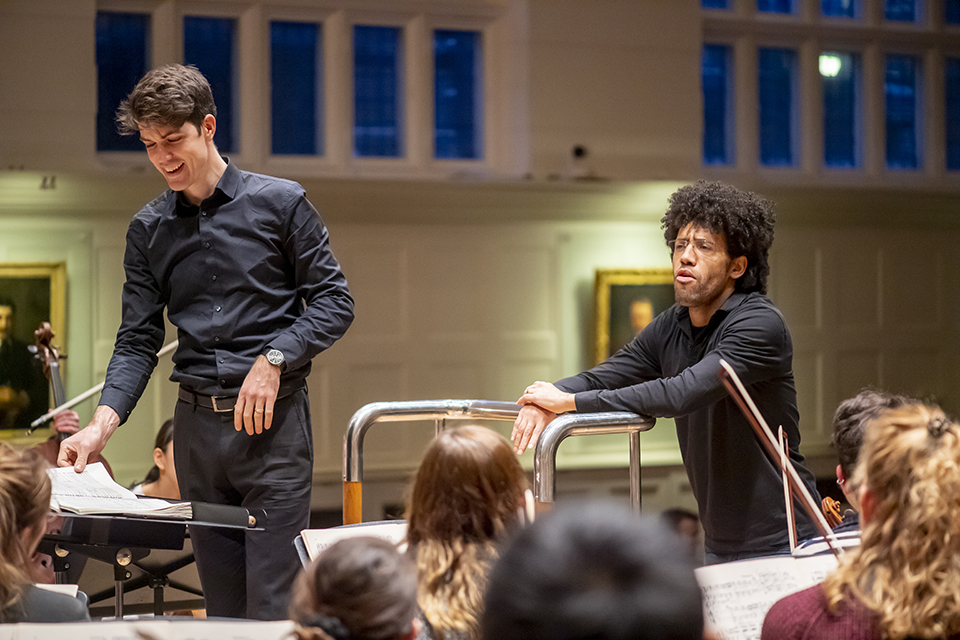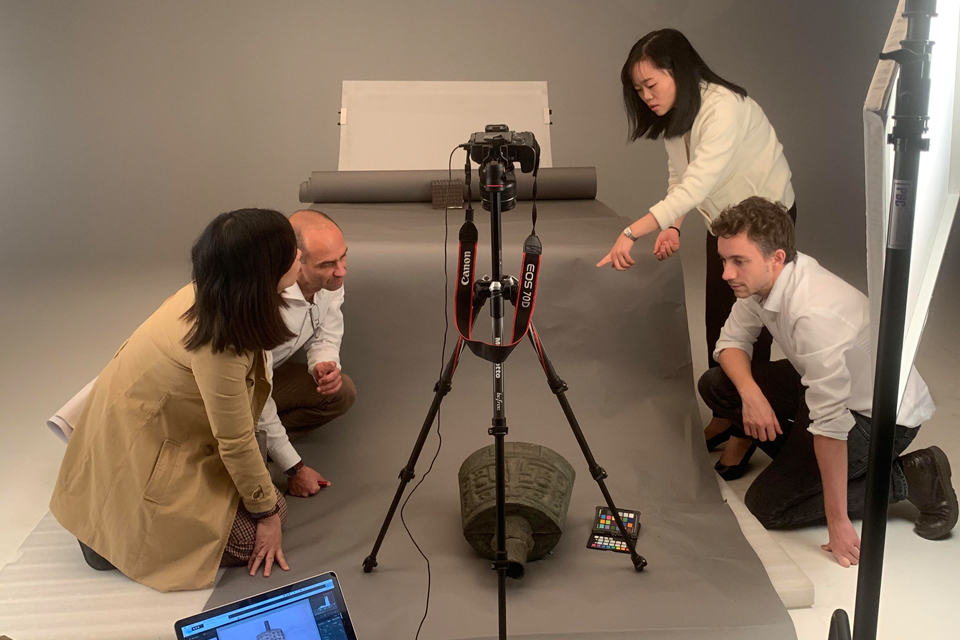In memory
Remembering and celebrating the lives of former students, staff and others associated with the Royal College of Music.
Christopher McMullen-Laird
It is with great sadness that we mark the passing of Christopher McMullen-Laird in June.
Chris graduated recently from the Royal College of Music with a Masters in conducting. In his two years' study at the RCM, he embraced and embodied many aspects of College life. He was much loved by his contemporaries and shared easily his joy and love of music and music-making.
Chris came to the RCM with notable experience in the world of opera, but he soon branched out into many other areas with enthusiasm and passion. His work with the children in the RCM Sparks programme was exceptional. Colleagues describe him as 'an extraordinary part of the Sparks programme while studying at the RCM. A pro-active, self-starter who wowed us all with his energy, creativity and warmth. From workshop-leading, to supporting, conducting or presenting he demonstrated amazing musicianship on an approachable, human level.'
Chris involved himself in all the communities within College; his enthusiastic support of the Chinese New Year Concerts is just one example. He found new and creative ways of performing: an exceptional project that he devised and presented both as concert and academic presentation was of a choreographed performance of Wagner’s Siegfried Idyll, with all performers playing from memory. This led to his further research and resources on memorisation for musicians, characteristically shared with his fellow students.
He led ensembles of all sizes and in a range of repertoire, from contemporary music with New Perspectives through to large orchestral performances with the RCM Philharmonic, in all cases with a respect, warmth and generosity to his fellow performers.
His professors, Peter Stark and Howard Williams, echo and amplify Chris’s easy-going, warm and inclusive personality. 'Always giving, never taking, he shared his deep love of music and his selfless yet infectious joy of life with all who were lucky enough to have known him. To him we were all friends. He showed constant gratitude for the opportunities that he enjoyed – both musical and social – and did his utmost to repay their benefits with his own boundless energy and enthusiasm. Chris was above all honest and open, never afraid to share his hopes and fears. It was a special pleasure to have taught him.'
Visiting Professor of Conducting Martyn Brabbins adds: 'As a student Chris was perfect to work with - those qualities of human warmth and inquisitiveness made him passionate in his desire to improve as a conductor, and to absorb as much information as quickly and efficiently as was humanly possible. Chris was a friend to everybody.'
Chris died on 18 June after a short illness while in Norway, where he was doing the thing that he loved and desired most of all – conducting fellow performers and sharing his passion for music.
Paul Bagshaw
Paul Bagshaw, musician and educator, took up the flute at age 11 and gained a county music scholarship that gave him the chance to study under acclaimed British flautist Atarah Ben-Tovim.
After graduating from the RCM in 1979, time with orchestras across the UK eventually led to the Lancashire-born Bagshaw relocating to South Africa, where he became Principal Flautist of the National Orchestra there. It was in South Africa that Paul first moved into educating, supplementing his performing career with initiatives like the Township Music Education Concert scheme.
South Africa would not be the extent of his worldly ambition: Paul relocated to Oman, where until 2005 he taught flute as part of the Sultan’s classical music education initiative. He later moved on to Bahrain, where he taught woodwind and was very popular with his students. He continued organising musical outreach: as well as concerts at St Christopher’s Cathedral in Manama, the capital, in 2015 he founded the St Christopher’s community band. In addition, Paul and his second wife Jean worked together to organise music exam sessions in Bahrain, a region where access to formal music exams can be limited. His ambition to open up musical education to communities around the world was much admired. He passed away in February 2020, and is survived by Jean and his two children, Tristan and Stephanie.
A full obituary can be read on The Guardian website.
Martin Lovett
Cellist Martin Lovett, the only British member of the renowned and feted Amadeus String Quartet, gained a scholarship to the Royal College of Music at age 15.
[image1]
Born in 1927, Martin first studied under his father, a cellist in the Hallé in Manchester and London Philharmonic Orchestra. Following his graduation from the RCM, Martin became Principal Cellist of the Sadler’s Wells orchestra, and freelanced at the Hallé and at Glyndebourne. In January 1948 the Amadeus Quartet made their London debut, and Martin continued to play with the ensemble for nearly forty years. He was awarded an OBE in 1970. Following the disbandment of the quartet in 1987, Martin continued to freelance and mentor, and remained an in-demand judge at chamber music competitions.
At the RCM he met Suzanne Rozsa: the pair later married and stayed together for 55 years, until Suzanne’s death. Martin is survived by his second wife, Dorinde van Oort, his children, Sonia and Peter Lovett, five grandchildren and eight great-grandchildren. He passed away on 29 April.
A full obituary is available to read on The Guardian website, and Martin was interviewed at the RCM in 2014 and a clip can be watched on the RCM site.
Sir Peter Jonas
A revered leader of heavyweight opera companies including the English National Opera and the Bavarian State Opera House, Sir Peter Jonas was a significant figure in opera across Europe.
London-born, Sir Peter's early years included a degree in Literature from the University of Sussex, studies at the Royal Northern College of Music, the Royal College of Music and the Eastman School of Music in New York, as well as work as a stagehand at Glyndebourne and roles in productions including the title role in Don Giovanni.
Beginning his career in opera administration as the assistant to conductor Georg Solti at the Chicago Symphony Orchestra, he was promoted to artistic administrator and stayed with the CSO until the mid-80s. From 1985 to 1993 he was General Director of the ENO, leading the opera house together with David Poutney and Mark Elder and spearheading revolutionary productions with innovative design and direction, forging an impressive run of successes. In 1990 he led the ENO on a tour of the Soviet Union, the first by a major foreign opera company.
As Intendant of the Bavarian State Opera House, from 1993 to 2006, Sir Peter launched 90 new productions, including a dozen world premieres, certainly making his mark as the first British national ever to run a German opera house. During this time, he lectured at the universities of Zurich and St Gallen, and continued teaching after his time running the opera house.
His legacy in the world of opera is significant, as indicated by his knighthood in the 2000 Honours List. He maintained a reputation for encouraging the programming of modern work, and his status as a radical did not deter opera houses including the Metropolitan Opera from offering him positions. For many years he could be spotted around London by his licence plate, 'ENO 1'.
Sir Peter died in April: he is survived by his wife, Barbara Burgdorf.
A full obituary can be read on The Guardian website.
Bernard Hall-Mancey
Bernard Hall-Mancey, from Reading, was a multi-instrumentalist and an ARCM.
After his time at the Royal College of Music and a further spell gaining a Diploma in Education from the University of Birmingham, he worked at Bromsgrove School, where he was Director of Music. His passion for choral music and singing was reflected in his work at the school and in his role as conductor of the Brierley Hill Choral Society.
In 1987 Bernard became a full-time examiner, although he continued to give his time offering mentoring at Bromsgrove School. He was respected as an adjudicator for competitions and was a valued member of the organising committee for the orchestra at St John’s Church in Bromsgrove. Later he would assist the David Morgan Trust, which was set up to support young musicians from the local area, and he remained secretary of Bromsgrove Concerts until his death. His enthusiasm and skill for helping young people in music was noted throughout his career. Bernard is survived by his two daughters, Susan and Gillian, and a large extended family, which includes five grandchildren. He passed away on 2 April.
Elizabeth de la Porte
Elizabeth de la Porte, FRCM won the University of South Africa's Overseas Scholarship as a teen, leading to three years studying as a harpsichordist at the Vienna Academy.
[image2]
From there, she went on to the Royal College of Music, becoming part of a new wave of concert harpsichordists performing popular concerts across Europe in the 1970s. Her highly praised recordings of JS Bach were released by Saga Records and Hyperion, and later reissued by London Independent Classics.
Elizabeth became a teacher at the Royal College of Music's Junior Department, coaching individual students and baroque ensemble groups, and stayed at the College for 55 years, making her the longest-serving member of staff before her retirement. In 2016 she was made an FRCM. Elizabeth shares three children with her husband, Dr Paul Dawson-Bowling. She passed away on 9 April.
Eileen Croxford Parkhouse
A celebrated cellist renowned for her ardent work helping young musicians, Eileen Croxford Parkhouse won the Queen's Prize and the Boise Award while studying at the Royal College of Music.
She would later become a professor at the College. In her performing career she took part in the BBC Proms and numerous leading orchestras.
At the RCM Eileen met David Parkhouse, a pianist, and they married. Together with violinist Hugh Bean CBE they set up the Music Group of London, a chamber group that enjoyed a significant career touring the world. After David’s death in 1989, Eileen set up the Parkhouse Award in his memory. The prize, which gives the winners the opportunity to play at a series of concerts at prestigious London venues, has afforded a multitude of young musicians an incredible start in the profession. It is regarded as the leading piano chamber music prize in the UK.
In Devon, following her retirement from performance, Eileen established the Shaldon Festival as another way to celebrate the life and achievements of David. Shaldon celebrated its 30th year in 2020. Eileen passed away in April, at the age of 96.
Her obituary can be read on The Strad website.
Dr Mary Remnant
Dr Mary Remnant DSG FSA, distinguished scholar and lecture-recitalist on medieval musical instruments, began her studies (violin and piano) at the Royal College of Music in 1952, winning the Tagore Gold Medal in her final year.
[image3]
She was awarded a Winston Churchill Travelling Scholarship in 1967 for research overseas and completed her DPhil thesis at Oxford University on 'Bowed Instruments in England up to the Reformation' in 1972.
Mary was an intrepid traveller, photographing medieval images and carvings in Europe and collecting regional instruments as far afield as Afghanistan. One of the pioneers of iconographical research into instruments, she published articles and books, receiving the Bessaraboff prize for her second book, and was elected a Fellow of the Society of Antiquaries. A loyal supporter of the RCM Museum, she later served on the Advisory Committee of the Museum of Music History.
She lectured to RCM students on the RCM BMus(Hons) course from 1970 and taught pupils in the Brompton Oratory Junior Choir. In her public lecture–recitals (on themes such as 'The Musical Road to Santiago de Compostela') she delighted audiences in the UK and abroad with lively performances on numerous instruments, including reconstructions she had commissioned.
Mary was made a Dame of St Gregory by Pope Francis in 2016. She died on 15 May aged 85 and will be much missed by her many friends.
Kenneth Woollam
A renowned tenor, Kenneth Woollam was perhaps best known for his time as Principal Tenor for the English National Opera, from 1972 to 1984.
His debut for the ENO as Pierre Bezukhov in Prokofiev's War and Peace was widely lauded.
Kenneth studied at Chester Cathedral Choir School, where he became Head Chorister. After his studies at the Royal College of Music he sang with the Glyndebourne Festival Chorus from 1962 to 1964, joining the BBC Singers before his tenure at the ENO. He appeared at the Metropolitan Opera with the ENO in 1984 and played Aegisthus in Richard Strauss' Elektra at Covent Garden in 1988. He also made appearances at Opera Scotland. Kenneth passed away on 15 April.
[additionalboxnobutton]


